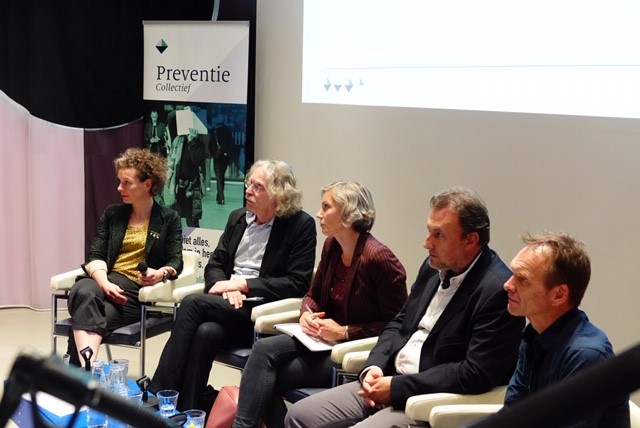
Report: Digital ecosystems for healthy ageing. A partnership for ageing well!
Aware of the challenges brought by the demographic change, public authorities and private entities in the Netherlands are joining forces to set up policies and practices for healthy living and ageing. NESTORE engaged with those committed stakeholders on the occasion of a dedicated public event on October 3rd 2019.
The event showcased the efforts undertaken by the city of Rotterdam, Preventie Collectif and the NESTORE project for putting health prevention at the center of public policies.
A multidisciplinary panel presenting local initiatives
The city of Rotterdam developed an inspiring policy guide, alongside with an implementation programme Ouder en Wijzer (‘Older and Wiser’), working on a digital transformation agenda (eHealth Agenda Rotterdam) and a prevention charter Gezond010 (‘Healthy City’). Carina van der Beek, Health Policy Manager at the city of Rotterdam highlighted also local initiatives to couple prevention with health inequalities by using digital technologies.
The life-course perspective in dealing with health and ageing was at the core of Preventie Collectief's contribution. Ton Bakker, Head of Research and Lector at the Hogeschool Rotterdam. Scientific evidence shows that prevention can reduce up to 50% the risks of developing dementia and of life-style diseases. Prevention throughout the life-span is the most powerful strategy for an healthy ageing society.
The European project NESTORE is developing a virtual coach sustaining our motivation for ageing well, advising on exercises and practices to remain physically, mentally and socially active. Per the words of its Principal Investigator, Giuseppe Andreoni who was also part of the panel, NESTORE aims at making prevention the healthy habit in each user's life, thus supporting also the national health system and the overall health ecosystem.
Developing such a personalised approch requires data, data governance and management. Gaston Remmers, Chairman of the Holland Health Data Cooperative, introduced the citizen-science approach that matches individual and social purposes with research driven and citizen-driven science. This approach mediates between individuals and large companies managing data, and foresees a genuine data intermediary with a negotiating power among the various parties (citizens, patients, public authorities, insurances and private companies).
A society of data... for health?
The panel discussion highlighted how these diverse initiatives share a common trend: they are all based on the gathering, processing and use of a vast amount of public and private data. On the one hand side data is needed to develop and implement programmes and tools for advancing on health and health prevention, while on the other hand side citizens are increasingly concern by the potential misuse of data that hinders the data flow.
However, if data is seen as an investment to improve health and health patterns, whose return on investment benefits users and citizens directly (rather than commercial entities), then prevention is closer at hand for citizens, also for the most vulnerable ones.
Along these lines, the networking among stakeholders was very fruitful, paving the way to new joint projects in Rotterdam among the city, Preventie Collectief, the Hogeschool Rotterdam and MyDataOurHealth intermediary, with NESTORE supporting the exchanges and implementation within the remit of its action.


